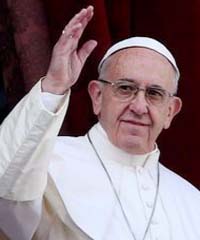
Reuters, Berlin :
Pope Francis has said he is willing to consider ordaining older married men as priests in isolated communities, but has ruled out making celibacy optional to tackle a shortage of clergy.
The shortage has prompted calls from some progressives to end the ancient tradition of celibacy for Roman Catholic priests.
Such a move would represent revolutionary change for the Catholic Church and would likely face massive resistance.
Reformers, however, have long suggested that the Vatican could ordain “viri probati”-Latin for men of proven character-who tend to be older, with grown-up families if married.
In an interview with Germany’s Die Zeit newspaper, the pope said this option could be considered.
“We have to give a thought to whether viri probati are a possibility. We then also need to determine which tasks they could take on, such as in isolated areas, for example,” he was quoted as saying.
He ruled out, however, opening the priesthood to all married men or watering down the Catholic Church’s commitment to celibacy, which is seen as a virtue that frees priests to devote their lives fully to serve God.
“Voluntary celibacy is often discussed in this context, especially in places where there are shortages of clerics. But voluntary celibacy is not a solution,” he said.
Prominent Catholics representing both the progressive and conservative wings of the U.S. church voiced support on Friday for the pope’s suggestion, with both camps seeing the move as a practical solution to the chronic shortage of priests.
A U.S. university report published in 2015 said the world’s Catholic population had increased by 57 percent, or 445 million people, between 1980 and 2012, while the number of priests over the same period had dropped by 17 percent, or 20,547.
In Brazil, the nation with more Catholics than any other, the faithful also expressed support for the viri probati idea.
“If he (a priest) had a wife and children, he may have a much fuller experience, which could help those around him,” said Paulo Franca, attending an afternoon Mass at the Santa Luzia Church in Rio de Janeiro.
The church has already sought to address a potential shortage of priests by promoting the use of deacons-male clerics who can be married and sit just behind priests in the church hierarchy. They can officiate at baptisms, funerals and weddings, but are not allowed to celebrate Mass, hear confessions or anoint the sick.
Pope Francis has said he is willing to consider ordaining older married men as priests in isolated communities, but has ruled out making celibacy optional to tackle a shortage of clergy.
The shortage has prompted calls from some progressives to end the ancient tradition of celibacy for Roman Catholic priests.
Such a move would represent revolutionary change for the Catholic Church and would likely face massive resistance.
Reformers, however, have long suggested that the Vatican could ordain “viri probati”-Latin for men of proven character-who tend to be older, with grown-up families if married.
In an interview with Germany’s Die Zeit newspaper, the pope said this option could be considered.
“We have to give a thought to whether viri probati are a possibility. We then also need to determine which tasks they could take on, such as in isolated areas, for example,” he was quoted as saying.
He ruled out, however, opening the priesthood to all married men or watering down the Catholic Church’s commitment to celibacy, which is seen as a virtue that frees priests to devote their lives fully to serve God.
“Voluntary celibacy is often discussed in this context, especially in places where there are shortages of clerics. But voluntary celibacy is not a solution,” he said.
Prominent Catholics representing both the progressive and conservative wings of the U.S. church voiced support on Friday for the pope’s suggestion, with both camps seeing the move as a practical solution to the chronic shortage of priests.
A U.S. university report published in 2015 said the world’s Catholic population had increased by 57 percent, or 445 million people, between 1980 and 2012, while the number of priests over the same period had dropped by 17 percent, or 20,547.
In Brazil, the nation with more Catholics than any other, the faithful also expressed support for the viri probati idea.
“If he (a priest) had a wife and children, he may have a much fuller experience, which could help those around him,” said Paulo Franca, attending an afternoon Mass at the Santa Luzia Church in Rio de Janeiro.
The church has already sought to address a potential shortage of priests by promoting the use of deacons-male clerics who can be married and sit just behind priests in the church hierarchy. They can officiate at baptisms, funerals and weddings, but are not allowed to celebrate Mass, hear confessions or anoint the sick.

